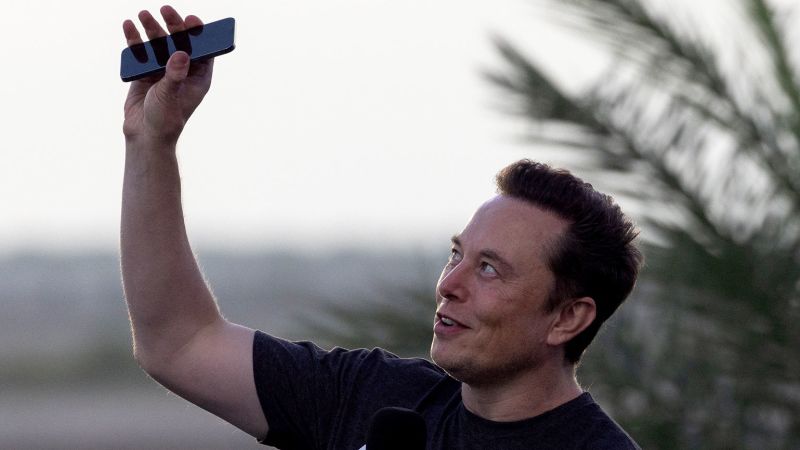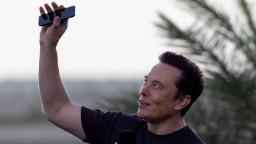

New York
CNN Business
—
Nearly three months after Elon Musk told Twitter he wanted out of his $44 billion agreement to buy the social media company, the Tesla CEO now once again wants to move forward with the deal.
The reversal, if finalized, not only has the potential to create upheaval for Twitter employees but also for the hundreds of millions of people around the world who use the platform daily.
In the first weeks after agreeing to buy the company in April, and before his move to bail on the deal, Musk repeatedly stressed that his goal was to bolster “free speech” on the platform and work to “unlock” Twitter’s “extraordinary potential.” He suggested he would rethink Twitter’s approach to content moderation and permanent bans on the platform, with potential impacts on civil discourse and the political landscape. He also talked about his desire to rid the platform of bots, even as he later made the number of bots central to his argument to abandon the deal.
In private and public statements over the past six months, Musk has tossed out a wide range of other possible changes for the platform, from enabling end-to-end encryption for Twitter’s direct messaging feature to suggesting this week that Twitter become part of an “everything” app called x, possibly in the style of popular Chinese app WeChat.
There have been more far-fetched suggestions, too. In one text exchange with his brother Kimbal Musk, revealed last week in court documents, the two appeared to discuss the possibility of asking users to pay for each tweet they post with small amounts of the cryptocurrency DogeCoin.
Perhaps the biggest immediate impact if the deal goes through: Musk has indicated that he would restore former President Donald Trump’s account on the platform, which could be a huge advantage if Trump decides to make another bid for the White House in 2024.
Now, with a deal that has long been in doubt appearing to be closer than ever to completion, some of those theoretical changes could soon become reality.
Here’s what users should know:
For years under former CEO and co-founder Jack Dorsey, Twitter emphasized its work to bolster “healthy conversations.” The company banned many accounts promoting abuse and spam, added labels for false or misleading information and banned the misgendering of transgender people.
Under Musk’s ownership, Twitter could unwind steps taken to make the platform more palatable for its most vulnerable users, typically women, members of the LGBTQ community and people of color, according to safety experts.
Musk has said Twitter, under his leadership, would have more lenient content moderation policies. “If in doubt, let the speech exist,” Musk said in one on-stage interview in April. “If it’s a gray area, I would say, let the tweet exist. But obviously in the case where there’s perhaps a lot of controversy, you would not necessarily want to promote that tweet.”
Musk has also said he wants to make Twitter’s algorithm open source and make it more transparent to users when, for example, a tweet has been emphasized or demoted in their feed. (Leaders at Twitter have previously expressed support for moving in that direction, and the company often makes clear when it is demoting certain tweets or types of content.)
But the most striking early change could come from who is and is not allowed on a Musk-owned Twitter.
Musk has said he thinks Twitter should be more “reluctant to delete things” and “very cautious with permanent bans.” That could mean a long list of controversial far right figures and conspiracy theorists, among others, soon find their way back on the platform.
Musk, for his part, has focused on bringing back one of Twitter’s most prominent former users: Trump.
“I do think it was not correct to ban Donald Trump, I think that was a mistake,” Musk said in May. “I would reverse the perma-ban. … But my opinion, and Jack Dorsey, I want to be clear, shares this opinion, is that we should not have perma-bans.”
Dorsey tweeted following Musk’s May remarks that he does “agree” there shouldn’t be permanent bans on Twitter users. “There are exceptions … but generally permanent bans are a failure of ours and don’t work,” he said.
Trump has said he does not want to rejoin Twitter and will instead remain on his own social media platform, Truth Social.
But if Trump were to accept a Musk offer to return to Twitter, it could restore a significant following he hasn’t had since being banned from the platform in January 2021, just as the 2024 US Presidential race ramps up. On Truth Social, Trump has only 4 million followers; on Twitter, he reached an audience of more than 88 million followers.
Another notable change is simply who may be making these sensitive decisions.
Musk has a mixed reputation in the tech industry. He is undoubtedly one of the most ambitious and successful innovators and entrepreneurs of this era, but he is also someone who has courted controversy, often from his own Twitter profile, where he has more than 100 million followers.
Over the years, Musk has used Twitter to make misleading claims about the Covid-19 pandemic, to make a baseless accusation that a man who helped rescue children from a cave in Thailand is a sexual predator, to mock people who display their gender pronouns on the platform and to make countless jokes involving the numbers 420 and 69. He has also tweeted a (since deleted) photo comparing Canadian Prime Minister Justin Trudeau to Adolf Hitler and has compared Twitter’s new CEO Parag Agrawal to Joseph Stalin.
Musk also previously sought to remove a Twitter account dedicated to tracking the movements of his private jet by offering to pay off the college freshman running the account (the account owner declined).
The same day he sent his letter to Twitter attempting to revive the deal, Musk was widely panned for comments he made on the platform about Russia’s invasion of Ukraine. He suggested making Crimea, a region Russia invaded and annexed from Ukraine in 2014, “formally part of Russia.” Most followers responded “no” to his poll and Ukraine’s Ambassador to Germany Andrij Melnyk replied in a tweet: “F— off is my very diplomatic reply to you.” In a follow-up tweet, an apparently frustrated Musk seemed to blame the results of his poll on a “bot attack.”
Until now, Twitter has, at least to some extent, been accountable for its policy decisions to advertisers, shareholders and its board. But those guardrails won’t necessarily exist under Musk’s leadership.
